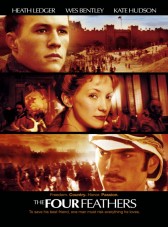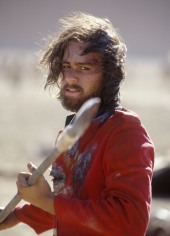|
The Four Feathers
|
| |
 |
USA, 2002. Rated PG-13. 125 minutes.
Cast:
Heath Ledger, Wes Bentley, Kate Hudson, Djimon Hounsou, Michael Sheen,
Lucy Gordon, Nick Holder, Alex Jennings, Kris Marshall, Rupert Penry-Jones,
Tim Pigott-Smith
Writers: Michael Schiffer & Hossein Amini, from the novel by A.E.W.
Mason
Music: James Horner
Cinematographer: Robert Richardson
Producers: Paul Feldsher, Stanley R. Jaffe, Robert D. Jaffe, Marty
Katz
Director: Shekhar Kapur
LINKS
|
 few
years ago, in kinder, gentler times, producer Stanley Jaffe secured Shekhar
Kapur to direct the sixth remake of The Four Feathers. Kapur, director
of the marvelously dark Elizabeth, was
going to remake the kind of fluff I'd watched as a boy on Saturday afternoons
at my grandmother's knee? I was intrigued. The last version was made for TV
in 1977 (starring Beau Bridges), so by Hollywood standards it was ripe for a
makeover. It should have been a no-brainer--an old-fashioned tale of loyalty,
honor, betrayal and redemption, with more than a dash of derring-do, set against
a backdrop of 19th century British colonial expansion, and cast with a clutch
of thrusting young bucks. It had the ingredients of a hit.
few
years ago, in kinder, gentler times, producer Stanley Jaffe secured Shekhar
Kapur to direct the sixth remake of The Four Feathers. Kapur, director
of the marvelously dark Elizabeth, was
going to remake the kind of fluff I'd watched as a boy on Saturday afternoons
at my grandmother's knee? I was intrigued. The last version was made for TV
in 1977 (starring Beau Bridges), so by Hollywood standards it was ripe for a
makeover. It should have been a no-brainer--an old-fashioned tale of loyalty,
honor, betrayal and redemption, with more than a dash of derring-do, set against
a backdrop of 19th century British colonial expansion, and cast with a clutch
of thrusting young bucks. It had the ingredients of a hit.
Too many cooks can spoil the broth, however. Kapur, born into an era of post-colonial
strife, as India and Pakistan sought autonomy from British rule, was determined
to put an overtly political spin on the tale, something he considered long overdue.
"If you look at the state of the world today," he has said, "you can trace it
back to one cause: colonization." The universal predilection for recycling stories,
ideas and characters in sequels and remakes surely means a fresh perspective,
challenging our comfort with the overly familiar, is welcome. Jaffe, however,
quit during production, apparently unhappy at Kapur's desire to re-tell the
tale with a slant that questioned the colonial ethos of A.E.W. Mason's 1901
novel and subsequent film adaptations. Yet Kapur seems equally unhappy with
the final result. The very week the film opened nationwide, Kapur was quoted
in Entertainment Weekly as saying, "I hate this film. Every cut, every
aspect of storytelling." Intriguing comment, to say the least.
In the empire-building days of Britain, convention had it that the first-born
son of the landed gentry would inherit, the second would serve in the military, the third the law, and the fourth (the so-called "Idiot Son") the church. Thus,
with no say in the matter, Harry Faversham (Heath Ledger) finds himself serving
in an army regiment commanded by his father. Clearly not a natural soldier,
his predicament is offset by the camaraderie of his fellow officers and an engagement
to Ephne Eustace (Kate Hudson). However, when the regiment is called upon to
quell an uprising in the Sudan, Harry resigns his commission, leaving the regiment
in the dead of night. Learning of this the next morning, Harry's closest friends
brand him a coward, symbolically sending him three white feathers. A fourth,
from Ephne, follows soon thereafter. Disowned to boot by his father, the ostracized
Harry broods in his garret while his comrades set sail for action in the desert.
Eventually he resolves to atone for his behavior by venturing to the Sudan to
watch over his regiment, disguised as a native.
the third the law, and the fourth (the so-called "Idiot Son") the church. Thus,
with no say in the matter, Harry Faversham (Heath Ledger) finds himself serving
in an army regiment commanded by his father. Clearly not a natural soldier,
his predicament is offset by the camaraderie of his fellow officers and an engagement
to Ephne Eustace (Kate Hudson). However, when the regiment is called upon to
quell an uprising in the Sudan, Harry resigns his commission, leaving the regiment
in the dead of night. Learning of this the next morning, Harry's closest friends
brand him a coward, symbolically sending him three white feathers. A fourth,
from Ephne, follows soon thereafter. Disowned to boot by his father, the ostracized
Harry broods in his garret while his comrades set sail for action in the desert.
Eventually he resolves to atone for his behavior by venturing to the Sudan to
watch over his regiment, disguised as a native.
Long before this point, it dawned upon me that maybe my nine dollars had bought
me a pig in a poke, as I was still waiting for a trace of the scathing indictment
of British colonialism. After all, Hudson has said of this movie, "It's so rare
that you get an opportunity to sit in a movie theater...and God forbid you have
to come out thinking." Now, either Kate Hudson is a dim as a 2-watt bulb, or
something happened between the original R-rated version that inspired her comment,
and the version on which I frittered away two hours of my life. Without ruling
out the former possibility, the latter appears worth a ten-spot at Off Track
Betting, as there was nothing in the version I saw that provoked any thought
beyond, "Will this ever end?" The three leads--Australian Ledger, Americans
Hudson and Wes Bentley--are rarely scintillating, and were working with a dreadful
script. Generally mustering passable English accents, the trio's greater problem
was their Eliza Doolittle-like struggle with enunciation, which appeared to
prevent them from actually acting.
It's all pretty enough, but it plods. Seemingly, endless codas show us the
return of each white feather to the donors, as Harry redeems himself--none of
which would have been possible without the help of A Noble Savage (Djimon Hounsou).
Befriending Harry with a reproach--"You English walk too proudly on the earth"--Hounsou
is arguably the real hero of the movie. But is the addition of a Man Friday-like
character the sum total of Kapur's efforts to redress the indisputable imbalance
in movie representations of the colonially subjugated?
Surely not. The editing throughout the movie suggests that a hand other than
Kapur's was at work in the post-production, eliminating Kapur's politicization.
Without a meatier subtext, all we are left with is the bones of the story, the
cheekbones of the actors, and the finery of the costumes. In effect, The
Four Feathers is a straightforward period romp. Even on that level, there
are hardly enough synonyms for "lame" in the dictionary to usefully comment
further. No wonder Kapur is unhappy.
Review
© October 2002 by AboutFilm.Com and the author.
Images © 2002 Miramax Film Corp. and Paramount Pictures. All Rights Reserved.

 the third the law, and the fourth (the so-called "Idiot Son") the church. Thus,
with no say in the matter, Harry Faversham (Heath Ledger) finds himself serving
in an army regiment commanded by his father. Clearly not a natural soldier,
his predicament is offset by the camaraderie of his fellow officers and an engagement
to Ephne Eustace (Kate Hudson). However, when the regiment is called upon to
quell an uprising in the Sudan, Harry resigns his commission, leaving the regiment
in the dead of night. Learning of this the next morning, Harry's closest friends
brand him a coward, symbolically sending him three white feathers. A fourth,
from Ephne, follows soon thereafter. Disowned to boot by his father, the ostracized
Harry broods in his garret while his comrades set sail for action in the desert.
Eventually he resolves to atone for his behavior by venturing to the Sudan to
watch over his regiment, disguised as a native.
the third the law, and the fourth (the so-called "Idiot Son") the church. Thus,
with no say in the matter, Harry Faversham (Heath Ledger) finds himself serving
in an army regiment commanded by his father. Clearly not a natural soldier,
his predicament is offset by the camaraderie of his fellow officers and an engagement
to Ephne Eustace (Kate Hudson). However, when the regiment is called upon to
quell an uprising in the Sudan, Harry resigns his commission, leaving the regiment
in the dead of night. Learning of this the next morning, Harry's closest friends
brand him a coward, symbolically sending him three white feathers. A fourth,
from Ephne, follows soon thereafter. Disowned to boot by his father, the ostracized
Harry broods in his garret while his comrades set sail for action in the desert.
Eventually he resolves to atone for his behavior by venturing to the Sudan to
watch over his regiment, disguised as a native.
